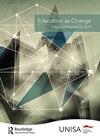Theory of Change and Theory of Education: Pedagogic and Curriculum Defects in Early Grade Reading Interventions in South Africa
IF 1
4区 教育学
Q3 EDUCATION & EDUCATIONAL RESEARCH
引用次数: 0
Abstract
Much of the field of educational change has focused on better understanding the theory of change, that is, what knowledge is needed to make substantial educational change, particularly improvement to learning outcomes at scale. This article suggests that the South African early grade reading study community may have been looking in the wrong place. The search for the optimal theory of change or theory of action is obviously very important, but could it not be that a key part of the problem is defects in our theory of education? It is argued that there may be something educationally unsound in certain aspects of the official pedagogy and curriculum. As such, the South African education system is unlikely to make much progress towards the goal of getting children to read for meaning by the time they are 10 years old if these defects are not addressed. To illustrate this argument, the article points to data from two examples in South African education policies on pedagogy and curriculum: the first relates to the Curriculum and Assessment Policy Statement (CAPS) Foundation Phase document’s under-specification and weak guidance with reference to the teaching of phonics with linked decodable texts; the second concerns the CAPS document’s privileging of an unworkable reading teaching methodology called Group Guided Reading. The article concludes that to achieve real knowledge breakthroughs, university academics working alongside researchers in government need to develop rigorous research programmes aimed at improving foundational learning outcomes.变革理论与教育理论:南非小学低年级阅读干预中的教学与课程缺陷
教育变革领域的大部分内容都集中在更好地理解变革理论上,也就是说,需要什么知识才能进行实质性的教育变革,特别是大规模提高学习成果。这篇文章表明,南非早期阅读研究社区可能一直在寻找错误的地方。寻找最佳的变革理论或行动理论显然非常重要,但问题的一个关键部分难道不是我们教育理论的缺陷吗?有人认为,官方教育学和课程的某些方面可能存在教育上不健全的地方。因此,如果这些缺陷得不到解决,南非的教育系统就不太可能在实现让孩子在10岁之前阅读有意义的目标方面取得很大进展。为了说明这一论点,文章引用了南非教育政策中关于教育学和课程的两个例子的数据:第一个例子涉及课程和评估政策声明(CAPS)基础阶段文件在使用可解码文本进行语音教学方面的规范不足和指导不力;第二个问题涉及CAPS文件对一种不可行的阅读教学方法——小组引导阅读的授权。文章的结论是,为了实现真正的知识突破,大学学者需要与政府研究人员一起制定严格的研究计划,以提高基础学习成果。
本文章由计算机程序翻译,如有差异,请以英文原文为准。
求助全文
约1分钟内获得全文
求助全文
来源期刊

Education As Change
EDUCATION & EDUCATIONAL RESEARCH-
CiteScore
1.40
自引率
0.00%
发文量
29
审稿时长
24 weeks
期刊介绍:
Education as Change is an accredited, peer reviewed scholarly online journal that publishes original articles reflecting critically on issues of equality in education and on the ways in which educational practices contribute to transformation in non-formal, formal and informal contexts. Critique, mainly understood in the tradition of critical pedagogies, is a constructive process which contributes towards a better world. Contributions from and about marginalised communities and from different knowledge traditions are encouraged. The articles could draw on any rigorous research methodology, as well as transdisciplinary approaches. Research of a very specialised or technical nature should be framed within relevant discourses. While specialised kinds of research are encouraged, authors are expected to write for a broader audience of educational researchers and practitioners without losing conceptual and theoretical depth and rigour. All sectors of education are covered in the journal. These include primary, secondary and tertiary education, adult education, worker education, educational policy and teacher education.
 求助内容:
求助内容: 应助结果提醒方式:
应助结果提醒方式:


